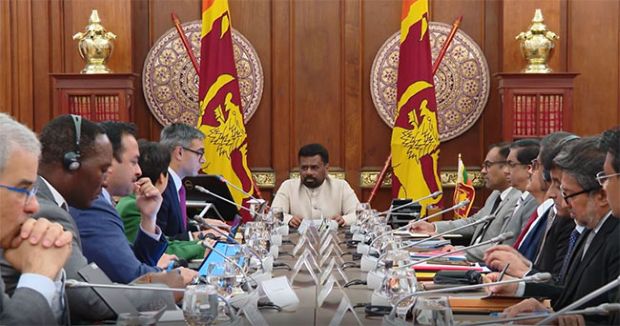IMF reaches staff-level agreement with Sri Lanka on fifth review of Extended Fund Facility
COLOMBO – The International Monetary Fund (IMF) has reached a staff-level agreement with Sri Lanka on the fifth review of the country’s reform program under the Extended Fund Facility (EFF), paving the way for the release of approximately US$ 347 million in the coming months, pending approval by the IMF Executive Board.
In a statement issued at the end of a two-week mission to Colombo, the IMF said the agreement reflects Sri Lanka’s continued progress in stabilizing its economy and implementing fiscal and structural reforms.
“Sri Lanka’s ambitious reform agenda continues to deliver commendable outcomes,” said Evan Papageorgiou, who led the IMF mission from September 24 to October 9. “The economy grew by 4.8% in the first half of 2025, inflation remains under control, and reserves have risen to US$ 6.1 billion. “Fiscal performance has been strong, supported by increased revenue, particularly from vehicle import taxes,” Papageorgiou added.
The IMF noted that program performance remains robust, driven by improved fiscal outcomes and stronger external resilience, emphasizing the importance of sustaining the reform momentum to preserve macroeconomic stability and strengthen the country’s ability to weather global uncertainties.
The staff-level agreement will require approval from the IMF Executive Board, which is contingent upon the Parliament’s passage of the 2026 Appropriation Bill in line with program parameters and confirmation of continued financial support from multilateral and bilateral partners.
Once approved, the new disbursement will bring total IMF assistance under the EFF to around US$ 2.04 billion since its approval in March 2023.
The IMF report underscores the need for sustained fiscal reforms, urging the government to continue strengthening tax compliance, broadening the tax base, and closing revenue leakages. It called for stronger public financial management, avoidance of expenditure arrears, and more efficient capital spending.
The Fund also stressed the importance of maintaining cost-recovery energy pricing, addressing the financial weaknesses of state-owned enterprises (SOEs), and ensuring that new laws on public-private partnerships, procurement, and asset management align with global best practices.
The IMF urged authorities to prioritize social protection, improve welfare targeting, and ensure adequate coverage of vulnerable populations.
“Protecting the poor and vulnerable should remain a priority,” Papageorgiou said, adding that there is scope to enhance Sri Lanka’s welfare payment system for greater effectiveness.
Debt restructuring is reported to be nearing completion, with the IMF encouraging swift finalization of agreements with all official and commercial creditors to restore debt sustainability. The establishment of a Public Debt Management Office, it noted, would be key to improving transparency and accountability.
The statement also highlighted the need to advance anti-corruption and governance reforms, including digitalization of revenue systems, stronger anti-money laundering frameworks, and accelerated recruitment at the Commission to Investigate Allegations of Bribery or Corruption (CIABOC).
During the mission, the IMF team held discussions with President and Finance Minister Anura Kumara Dissanayake, Prime Minister Dr Harini Amarasuriya, Central Bank Governor Dr P. Nandalal Weerasinghe, and senior government officials. The delegation also met with members of Parliament, private sector representatives, civil society organizations, and development partners.
-ENCL



Comments are closed, but trackbacks and pingbacks are open.